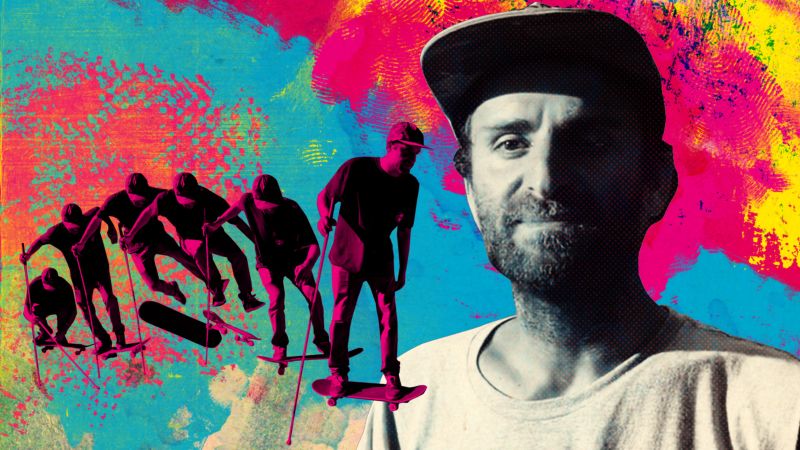The blind skateboarder challenging misconceptions about sight and sport | CNN
CNN
—
Dan Mancina is a skateboarder whose jaw-dropping videos rack up hundreds of thousands of views.
He has a loyal following on Instagram, all eager to see him landing jumps and all sorts of skillful tricks.
Mancina also happens to be blind – and videos of him using his white cane as he boards inspires curiosity and admiration from fans around the world.
“I’ve lost my vision slowly throughout my life,” he told CNN Sport, explaining that it wasn’t until his mid-20s that his condition – a neurodegenerative eye disease called retinitis pigmentosa – started to affect his dayto-day life, stopping him from driving and biking.
“Eventually [I] got to the point where I didn’t think I could leave the house without a person, like a human guide or somebody, a friend. I couldn’t even walk around my own block and stuff like that,” the 35-year-old added.
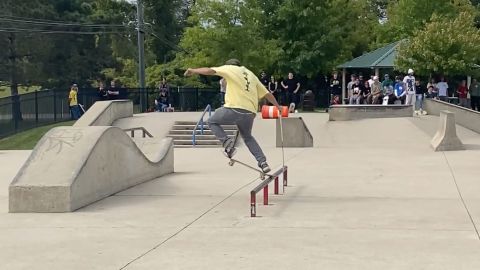
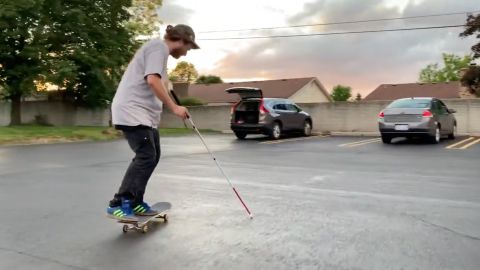
“I’m trying to figure out “what is a blind person? What can a blind person do?”
The Michigan native started skating at seven, but got into it more seriously at 13, developing a love for the sport which he says helps him express himself.
“You can do it by yourself if you want to, or with friends, and just kind of be in your own little world,” he said.
Mancina, who had dreams of being a pro-skateboarder, stopped skating for a couple of years. This period, he said, was his “lowest point.”
But orientation and mobility training helped him gain confidence and, slowly, he returned to doing what he loved, fishing, spending time outdoors and, of course, skateboarding.
“I really thought skateboarding was done and out of my life and in my past,” the American, who counts Adidas as one of his sponsors, said.
“I didn’t think I’d be able get the same things out of it that I did when I was sighted, or be able to really progress or push myself.”
He started filming short videos of his progress and posting on Instagram and Youtube and met a new group of people to skate with, gaining enough confidence to return to the streets.
“It just took me actually trying it, and doing it and then realizing I can get those things out of it,” he added.
“I’m going through these realizations about my blindness and myself and realizing: I’m still the same person and I can still do all the things that I love. I just had to do them a little bit different.”
Now, Mancina wants to challenge misconceptions around blindness and create spaces where visually impaired people can enjoy the sport.
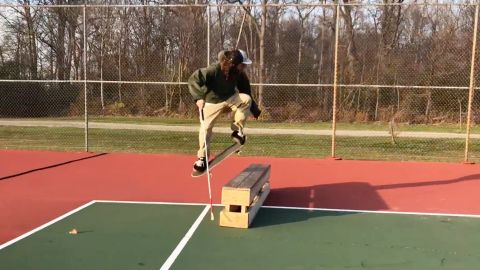
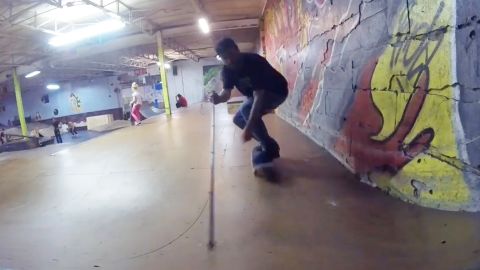
“I wanted to build the first fully adaptive skatepark designed around visual impairments, so I started a foundation called ‘Keep Pushing Incorporated’ and have been raising money ever since [for] a few years now,” he said.
The park, set to be built in Mancina’s home state of Michigan, will use adaptive methods, such as increasing the size of obstacles, adding contrast to obstacles and using auditory cues to make it safe and accessible.
“[The] ledges are really long and flat bars are really long, the quarter pipes are really wide.
“So there’s kind of more time to figure out where you are in the park, find your way around, easier to get on and off rails for wheelchairs and using a lot of contrast too, is important for those who have a little bit of residual vision between the ramps and the ground,” he explained.
Mancina has raised around $40,000 for the park, and after pouring concrete this fall, hopes to be running skate workshops by next spring and summer.
With a spacious layout and tactile ground, Mancina is building the park with blind schools, organizations, rehabilitation centers, and other adaptive sports organizations in mind.
“They should have access to everything, just like every other child,” he said. “Skateboarding is just one of those things – you know, it’s not for everybody, but there are going to be those kids who want to skate.
“I’m honored and hopefully I can be a voice for our community. That’s why I started my social media stuff, to change the perception of the visually impaired.
“I noticed a big difference in the way people treated me as a sighted person compared to a blind person,” he said, explaining that some people have lower expectations of what a blind person can achieve.
“Some people think it’s crazy and not possible to skate. It’s not that crazy … in my head. It’s just, I enjoy skating. So I’m going to do it. So I encourage people to think that way – don’t let other people dictate your life and decide what you can and can’t do. You know, it’s all up to you.”
As for the future, Mancina has lots of plans.
“Number one is just skating as long as I can and keep being able to live this life for as long as I can,” he said.
“Keep filming parts [is goal] number one, and then keep progressing, all that stuff, and then working towards getting skateboarding in the Paralympics.”
For all the latest Sports News Click Here

